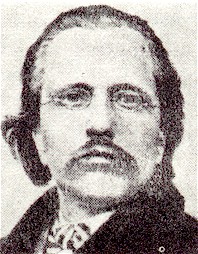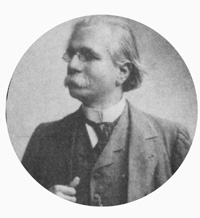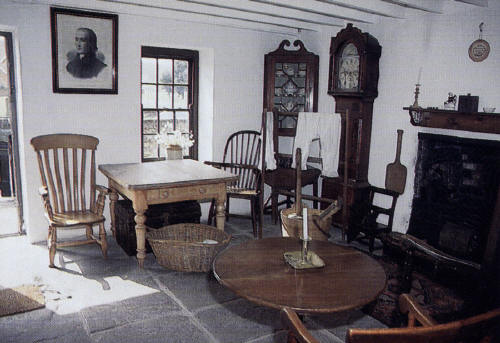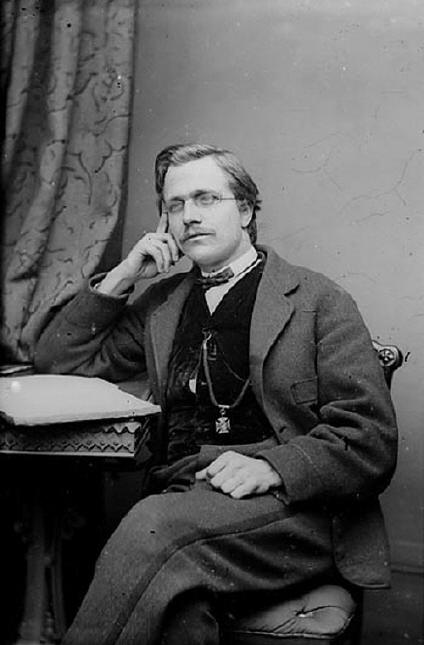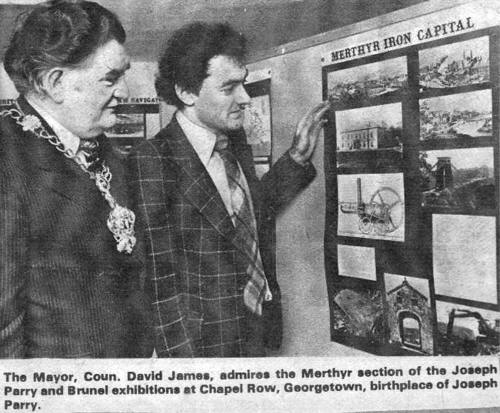My Deliberation on Myfanwy
By Merthyr Historian Carl Llewellyn
The
most famous Welsh love song is called “Myfanwy”, the music was
written by that eminent Welsh composer, Dr Joseph Parry. What is not
commonly known to most people the original words accompanying the
music were written in English by "Cuhelyn" and titled “Arabella”,
the date of its origin can not be determined.
The tune had such an accord with Welsh people, Welsh lyrics were
written by one of the great poetic bards
“Mynyddog” (Richard
Davies 1833-1877)
the lyrics were
transposed from the medieval language into modern literate Welsh.
Davies may have been influenced by some earlier work of Hywel ap
Einion Llygliw (c.1350) who wrote 'Myfanwy' in honour of one Myfanwy
Ferch Tudor Trefor
The myth of Myfanwy
The ruin of Castell Dinas Brân (Crow City
Castle), which stands above the town of Llangollen, is the site of a
tragic love story involving Myfanwy, a name that is not as unusual
as you might think - sparking plenty of comments.
Myfanwy, daughter of the Norman Earl of
Arundel, was said to be the most beautiful woman in Powys, but she
was vain and liked nothing better than to be told how beautiful she
was.
Many men went to Dinas Brân to court her,
but she had nothing to do with them, even if they were rich and
handsome because they were unable to compose and sing poems that
supposedly reflected the depth of her beauty.
Only one man, Hywel ap Einion, a penniless
young bard who lived in the valley below the castle, was said to
have the talent to satisfy Myfanwy.
Luckily, Hywel was in love with Myfanwy,
and one day he plucked up the courage to climb up the hill to the
castle with his harp, to sing and play to her.
He was allowed in to play for her, and
while playing and complimenting her on her beauty she was said to
have been unable to either listen or look at any other man.
Because of this Hywel believed that she
had fallen in love with him. But his hopes were dashed when a
richer, more handsome and more eloquent lover arrived on the scene.
Hywel, discarded and quickly forgotten by Myfanwy, composed a poem
to his lost love:
Far from Myfanwy's
marble towers
I
pass my solitary hours
O
thou shinest like the sky,
Behold thy faithful Hywel die!
Myfanwy = Means "my woman" from the Welsh prefix
my "my" combined with banw "woman”, a term of
endearment when describing a female soul mate, another translation
which is more commonly use to convey its meaning of someone precious
“The rare one”
Whether or not “Mynyddog”
had been influenced by the poetic deft of another bard, no
one will ever know, but his words certainly captured the dept of
emotion felt by a spurned lover. The music will always be synonymous
with Wales and the romantic sentiment of the Welsh; without any
doubt it will survive the rigors of time because Male Voice Choirs
whether English or Welsh are frequently requested to perform the
immortal love song. It has an individual significance to most Welsh
people reminding them of love ones, family ties, or memories of
their homeland Wales or across the ocean.
In my opinion the most descriptive translation from Welsh into
English was translated by Mr John H. Price (Dowlais)
Myfanwy
Myfanwy why does wrath’s dark
shadow
So fill those jet black eyes of
thine
Why do your tender cheeks
Myfanwy
No longer with loves blushes
shine
Where is the smile that once
ignited?
The fire of love within my
breast
Where lurks that tone thy voice
delighted?
My heart to flee to thee for
rest
How did I wrong thee Oh
Myfanwy?
To earn that frown of bitter
scorn
Were thou but playing Oh
Myfanwy?
Whilst golden chords of love
were born
Thou art mine own by word of
honour
Will thou not keep that pledge
of thine?
I do not seek thy hand Myfanwy
Unless thine heart is also mine
May all your lifetime Oh
Myfanwy
Neath brightest sunshine ever
stay
And may good health like
blushing roses
Bring beauty to thy cheek each
day
Forget those idly broken
pledges
That o’er my heart did cast
their spell
Stretch forth thy hand my dear
Myfanwy
That I might say one word
.......Farewell
In 1947 Merthyr Tydfil born author Jack Jones wrote a book titled
“Off to Philadelphia in the morning” relating the story about some
aspects of the life of Dr Joseph Parry combing facts in a fictional
narrative, the book was adapted as play for Welsh Radio in 1949,
since that time the book has received widespread acclaim. In 1977
BBC did a successful series of programmes titled “Off to
Philadelphia in the morning” Myfanwy” played by two actress’s Donna
Edwards in her youth and Siân Phillips in her mature years.
The fictional character “Myfanwy” depicted by Jack Jones in his
novel “Off to Philadelphia in the morning” portrays a girl with a
disposition of strength to be admired and ambition to rise from rags
to riches, revealing the devotion and love for her father who
suffered blindness and physical disfigurement through an horrific
accident leaving him to bear life’s hardship without employment.
Though poor and destitute Myfanwy’s voice is the only attribute she
possesses, inherent from her father Dick Llewellyn, though her
living conditions are squalor and her environment is polluted, like
any bird such as the nightingale she rises above her poverty status
through her love of music. As a child Myfanwy becomes a close friend
of young boy called Joseph Parry but their friendship comes to an
abrupt end when he emigrates to Danville Pennsylvania. So the two
young people go their separate ways. While Joseph Parry’s musical
talent was cultivated in a career in music Myfanwy also pursued a
vocation in music. After the death of Myfanwy’s father’s an old
farmer who was childless recognised Myfanwy’s vocal ability and
bequeathed money in his will for her musical education, this
opportunity to nurture Myfanwy’s God given talent allowed her the
privilege to enter the world of opera and become an opera singer,
eventually taking the name of Vera Van Ellen. On a chance meeting in
Merthyr Tydfil Joseph Parry and Vera Van Ellen (Myfanwy) encountered
each other, Myfanwy’s reason for visiting the town of her birth
place were nostalgic, her health had deteriorated and her life
expectancy was imminent, she wanted to visit her father’s grave,
seeing Joseph Parry rekindled memories when they were childhood
sweethearts.
And so, with love comes pain, a brief encounter reawakens dormant
memories, the fleeting liaison between Joseph Parry and Myfanwy
Llewellyn (Vera Van Ellen) ends as they both go their separate ways,
for Joseph Parry it was to bid Myfanwy, “Farewell” forever.
Though the book “Off to Philadelphia in the morning” depicts the
life of Joseph Parry it also captured the essence of a girl called
Myfanwy who was born into lowly existence and survived its trails
and tribulations. It also demonstrates how childhood friendships
will always be deep routed within souls.
The character Myfanwy in the novel “Off to Philadelphia in the
morning” has encapsulated the association of Joseph Parry’s love
song as felt by lover’s loss of his unrequited love.
Like many love stories this one has a tragic end, though the strings
of the heart cease to play, the tune never dies the adage comes to
mind “Better to have loved and lost than never loved at all”.
“Mynyddog”
Richard Davies was the son of Daniel Davies, "deacon and precentor
in the Old Chapel" - and I'm guessing that it must have been Yr Hen
Gapel, Dolfach, Llanbrynmair. He was born nearby at Dol Lydan on 10th
January, 1833. He was a farmer, but became famous as a poet and
writer of hymns, and was a leading light in many eisteddfodau, both
in Wales and in America. He took his baric name of Mynyddog from the
hill nearby his place of birth, Newydd Fynyddog, and lived at
Bron-y-Gan, Cemmaes, until his death on 14th July, 1877.
